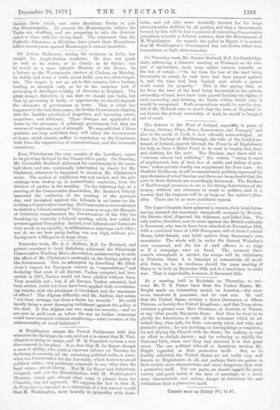M. Waddington carries the French Parliament with him whenever he
challenges its vote, and yet it is stated that M. Wad- .dington is going to resign, and M. de Freycinet to form a new Government in his place. It is clear that M. Le Royer, though It man of ability, who made a vigorous defence on Tuesday for declining to amnesty all the remaining political exiles, is some. ,.what too Conservative for the Assembly, which desires to see all political exiles,—not positively criminals in any other than the legal sense,—set at liberty. But M. Le Royer had definitively resigned, and yet the dissatisfaction with M. Waddington's Ministry, which gets almost what votes it pleases from the Chamber, was not appeased. We suppose the fact is, that M. de Freycinet is regarded as a statesman of a less narrow mould than M. Waddington, more heartily in sympathy with Gam-
betta, and yet also more decidedly trusted for his large administrative abilities by all parties, and that a Government formed by him will be less suspected of concealing Conservative prejudices beneath a Liberal exterior, than the Government of M. Waddington. As regards the policy in Egypt, it is certain that M. Waddington's Government has not shown either true benevolence or high statesmanship.






































 Previous page
Previous page